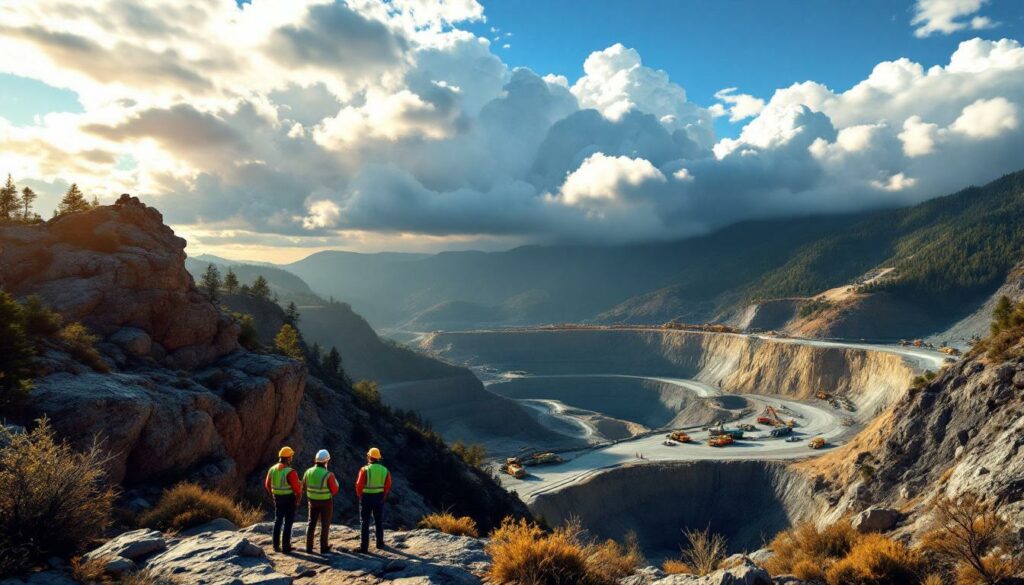Mexico's Mining Policy Shift: No New Concessions Under Sheinbaum Administration
Mexico has entered a new era of resource management with President Claudia Sheinbaum's decisive June 23, 2025 announcement that the country will halt all new mining concessions. This policy continues and strengthens the restrictive stance toward mining established during former President Andrés Manuel López Obrador's administration, signaling a fundamental shift in how Mexico manages its mineral wealth and implements sustainable mining strategies.
"There will be no new concessions—no, no new mining concessions," President Sheinbaum declared firmly during her announcement, emphasizing the administration's commitment to environmental protection and sustainable development.
What is Mexico's New Mining Policy?
The new mining policy represents a comprehensive overhaul of Mexico's approach to mineral resource management. At its core, the policy implements a complete moratorium on new mining concession approvals while simultaneously launching a thorough review of existing operations and their environmental impacts.
"The environmental impact of existing mines will be examined," President Sheinbaum stated, making clear that even current operations will face increased scrutiny. This examination will be particularly focused on open-pit mining operations, which have historically generated significant environmental concerns.
Environment Minister Alicia Bárcenas has been specifically tasked with addressing mining pollution issues across the country. Her department will lead the evaluation of current exploration activities and develop strategies to reduce environmental damage from active mining operations.
The policy establishes a framework where mining can continue but under significantly more rigorous environmental standards and oversight. This approach reflects a delicate balancing act between maintaining Mexico's position as a global mining landscape leader while addressing growing environmental and social concerns.
Why is Mexico Implementing This Mining Restriction?
Environmental Protection Priorities
Environmental protection stands as the primary driver behind Mexico's mining policy shift. Decades of relatively permissive mining regulations have resulted in substantial environmental damage across various regions, prompting this more restrictive approach.
"If there are open-pit mines, efforts must be made to minimize environmental impact and comply with existing laws," President Sheinbaum emphasized, highlighting the administration's commitment to reducing ecological harm from mining operations.
Environment Minister Alicia Bárcenas faces the challenging task of developing and implementing comprehensive strategies to address existing pollution from mines. Her work will focus on:
- Evaluating water contamination from mining operations
- Assessing soil degradation in mining regions
- Developing remediation plans for damaged ecosystems
- Ensuring compliance with environmental regulations
Open-pit mining operations face particularly intense scrutiny due to their significant land disturbance, potential for acid mine drainage, and visual impact on landscapes. These operations will need to demonstrate substantial environmental mitigation measures to continue operating, including mine reclamation innovations.
Balancing Resource Development with Sustainability
The Sheinbaum administration is attempting to fundamentally reshape Mexico's mining sector to align with sustainability principles. This approach recognizes that mineral extraction remains economically important but must evolve to minimize ecological impacts.
Economy Minister Marcelo Ebrard articulated this vision during a mining conference on June 18, 2025, stating: "The president wants us to make extraordinary efforts to enhance technological capabilities and consider new 21st-century mining in this new context, which must align with sustainability and community well-being."
This policy shift elevates community interests as a central consideration in mining operations. Mining companies will increasingly need to demonstrate tangible benefits to local populations and secure social licenses to operate through meaningful engagement with affected communities.
The administration is encouraging technological advancement within the mining sector, particularly innovations that can reduce environmental footprints. This includes water recycling systems, renewable energy implementation at mining sites, and more efficient extraction methods that minimize waste.
How Will This Policy Impact Mexico's Mining Industry?
Economic Implications
The immediate economic impact of Mexico's mining policy shift creates significant uncertainty for the sector. According to CAMIMEX (the Mexican mining industry trade organization), the industry reportedly lost $4.5 billion in investments during the previous López Obrador administration due to restrictive policies.
This latest announcement is likely to further discourage new investment in Mexico's mining sector. Companies with exploration interests face particular challenges, as their ability to develop new projects has been effectively frozen. Many may redirect their capital to more mining-friendly jurisdictions in Latin America or elsewhere, as reported by The Northern Miner.
Interestingly, CAMIMEX has not yet formally responded to President Sheinbaum's announcement, suggesting the industry may be carefully calculating its response or negotiating behind the scenes. Their silence speaks volumes about the delicate position mining companies now find themselves in.
The policy creates a potential dichotomy in Mexico's mining landscape:
- Established mines with existing concessions will likely continue operations but face increased compliance costs
- Exploration companies and those seeking expansion will either pivot to other countries or refocus on processing rather than extraction
- Companies specializing in environmental remediation and sustainable mining technologies may find new opportunities
Global Market Position at Risk
Mexico will not approve new mining concessions, which puts its prominent position in global mineral production at significant long-term risk. As the world's largest silver producer and a major contributor of gold, copper, lead, and zinc, any constraint on new mine development could eventually impact global copper supply forecast and other metals markets.
Data from S&P Global Market Intelligence confirms Mexico's crucial role in global metals markets. The inability to develop new mines as existing operations deplete their reserves could gradually erode Mexico's market share and influence in these markets.
Supply constraints resulting from this policy could potentially affect global metal markets in several ways:
- Gradual tightening of silver supplies, potentially supporting higher prices
- Reduced exploration for new copper deposits despite growing global demand for electrification
- Diminished development of gold projects despite the metal's continued investment appeal
- Potential shortfalls in lead and zinc as existing mines mature
International mining companies with significant Mexican operations will need to reassess their long-term strategies. Many may choose to redirect investments to jurisdictions with more predictable regulatory environments and clearer paths to project approval, according to recent analysis from Reuters.
What Exceptions Exist Within the New Policy?
Strategic Minerals Focus
Despite the broad halt on new mining concessions, the Sheinbaum administration has carved out notable exceptions for minerals deemed strategically important to Mexico's economic future.
Lithium production remains a clear priority for domestic development. President Sheinbaum specifically mentioned that environmental impact reports for direct lithium extraction in Sonora will still be processed, indicating the strategic importance of this battery metal to Mexico's industrial future.
"We will process environmental impact reports for lithium mining in Sonora," Sheinbaum stated, highlighting the special status accorded to this increasingly valuable resource in the global transition to clean energy.
Copper has also been recognized as strategically important despite environmental concerns associated with its extraction. President Sheinbaum emphasized that "efforts must be made to minimize environmental impact" while acknowledging copper's importance to Mexico's industrial base.
The administration is particularly focused on developing value-added processing capabilities rather than simply extracting and exporting raw materials. "We should produce copper products, all products derived from copper mining," Sheinbaum noted, indicating a desire to capture more of the value chain within Mexico.
Existing Operations
Current concession holders will continue operations but under significantly greater environmental scrutiny than in the past. These established mining operations face a new operational reality with several key characteristics:
- Environmental impact assessments will determine the scope of continued exploration within existing concessions
- Compliance with environmental laws will be more strictly enforced, potentially increasing operational costs
- Technological improvements to reduce environmental impact will be increasingly expected and potentially mandated
- Community relations will receive greater attention from regulators and government officials
This two-tier approach—restricting new development while allowing existing operations to continue under enhanced oversight—allows the government to address environmental concerns while avoiding the economic shock of shutting down the mining sector entirely.
What Does This Mean for Mexico's Economic Strategy?
Resource Nationalism Trend
Mexico's mining policy shift aligns with a growing resource nationalism trend across Latin America. This approach prioritizes domestic control over strategic minerals and emphasizes local benefit from resource extraction rather than maximizing foreign investment.
The policy strongly emphasizes value-added processing within Mexico over raw material exports. This represents a significant pivot from being primarily an extraction-focused industry to developing more sophisticated processing capabilities within the country.
Economy Minister Marcelo Ebrard confirmed this approach, stating that the mining industry is "at the core of Mexico's economic security decision-making." This framing positions mining not merely as an economic sector but as a strategic national interest with implications for Mexico's sovereignty and development.
This resource nationalism approach has several potential advantages for Mexico:
- Greater domestic job creation in processing and manufacturing
- Development of more specialized technical expertise within the workforce
- Reduced economic vulnerability to commodity price fluctuations
- Enhanced ability to supply domestic manufacturing with strategic materials
Economic Security Framework
The Sheinbaum administration has positioned mining as fundamental to Mexico's economic security. This framework integrates mining policy with broader economic development goals rather than treating it as an isolated extractive industry.
The government is actively seeking to enhance technological capabilities within the mining sector. Economy Minister Ebrard emphasized the president's desire for "extraordinary efforts to enhance technological capabilities," indicating potential government support for research and development in mining technology.
Sustainability requirements are being integrated into economic planning rather than treated as separate regulatory hurdles. This approach represents a significant shift from seeing environmental protection as opposed to economic development toward viewing sustainable practices as essential to long-term economic health.
Community benefits have been elevated as essential to mining operations under this new framework. This suggests mining companies will increasingly need to demonstrate tangible positive impacts on local communities to maintain their social license to operate.
What Are the Long-term Implications for Global Metal Markets?
Supply Chain Considerations
Mexico's policy shift creates potential constraints on new production of silver, gold, copper, lead, and zinc—all metals where the country is currently a major global supplier. As existing mines deplete their reserves, the lack of new development could gradually tighten global supplies.
This supply dynamic could have price implications, particularly for silver where Mexico holds a dominant market position. Without new Mexican mines coming online, global silver markets may need to rely more heavily on recycling and production from other countries to meet demand.
Investment patterns in the global mining sector may shift in response to Mexico's policy. Capital that might have flowed to Mexican projects could be redirected to mining jurisdictions with more favorable regulatory environments, potentially accelerating development in countries like Peru, Chile, or beyond Latin America entirely.
The policy may also drive increased focus on recycling and alternative sourcing for key metals. As primary production faces constraints, secondary recovery from electronic waste and other sources could receive greater attention and investment.
Sustainability Transition
Mexico's approach may influence mining policies in other countries, particularly those with similar environmental concerns or political dynamics. The Mexican model of restricting new development while focusing on improving existing operations could serve as a template for nations seeking to balance resource development with environmental protection.
Environmental standards for mining operations could become more stringent globally as countries increasingly prioritize sustainability over maximizing extraction. Mexico's policy adds momentum to this trend, potentially accelerating the adoption of stricter standards worldwide.
Mining companies may accelerate adoption of cleaner technologies in response to these regulatory pressures. Innovations that reduce water usage, minimize tailings, or decrease energy consumption could receive greater investment as companies seek to adapt to a more environmentally conscious regulatory landscape.
Community engagement may become more central to mining project development globally. Mexico's emphasis on community benefits as essential to mining operations reflects a broader trend toward greater local participation in resource decisions, potentially reshaping how mining companies approach project development.
"The president wants us to make extraordinary efforts to enhance technological capabilities and consider new 21st-century mining in this new context, which must align with sustainability and community well-being." – Economy Minister Marcelo Ebrard
FAQ About Mexico's Mining Policy
Will existing mines be forced to close under the new policy?
No, existing mines will continue to operate but will face increased environmental scrutiny and may need to implement additional pollution control measures. The government has emphasized reviewing environmental impacts rather than shutting down operations.
How does this policy affect foreign mining investments in Mexico?
Foreign mining companies will be unable to secure new concessions but can continue operating existing ones. This may redirect new investment to other countries with more favorable mining policies. Companies focused on processing rather than extraction may find continued opportunities.
Is Mexico's position as the world's largest silver producer at risk?
While current production will continue, the lack of new concessions could eventually impact Mexico's silver output as existing mines deplete their reserves without new developments to replace them. The timeline for this impact depends on reserve life at current operations.
What specific environmental improvements is the government seeking?
The government is particularly concerned about pollution from mines, environmental impacts from open-pit mining, and ensuring operations comply with existing environmental regulations. Specific targets include water quality protection, reduced land disturbance, and better waste management.
How does lithium fit into Mexico's mining strategy?
Despite the general halt on new concessions, lithium remains a strategic priority. The government will continue processing environmental impact reports for lithium mining in Sonora, indicating special treatment for this critical battery metal. This approach aligns with global efforts to secure battery mineral supply chains.
Ready to Capture the Next Major Mineral Discovery?
Stay ahead of the market with real-time alerts on significant ASX mineral discoveries through Discovery Alert's proprietary Discovery IQ model, turning complex geological announcements into actionable investment opportunities. Explore why major mineral discoveries can lead to exceptional returns by visiting Discovery Alert's dedicated discoveries page and begin your 30-day free trial today.




